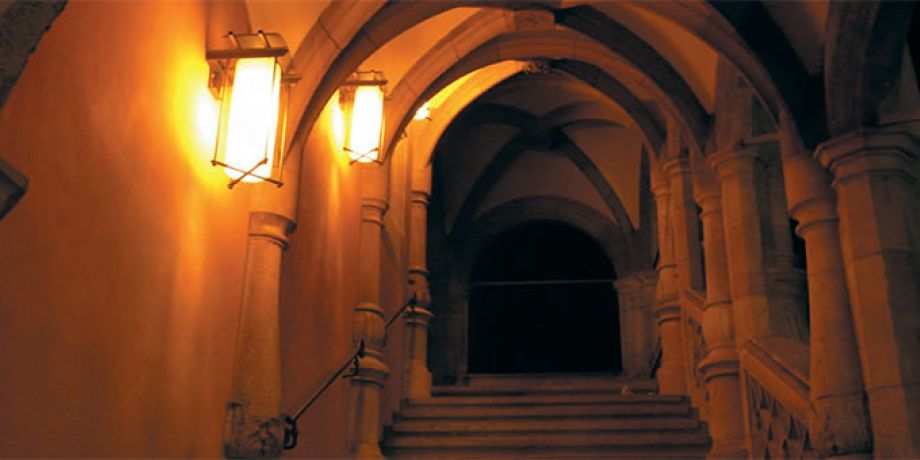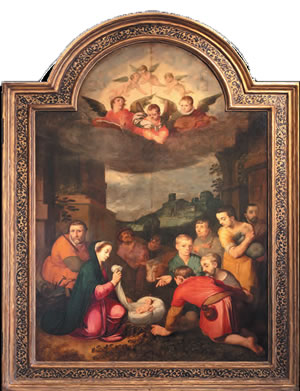
Unexpected Guests
Fr. Bobby Gilmore recalls how a young couple from Cuba arrived unannounced on his doorstep in Jamaica, seeking refuge, and reveals what became of them.
My doorbell roused me from sleep at about half past five in the morning. It seldom rang at that hour of the morning, as Jamaicans, while early risers, do not move around until an hour or so later. I wondered who could this be and what kind of an emergency had arisen? Getting to the door I shouted, “who’s there?” Opening the door I saw two young European-looking people in front of me, a young man and a woman. Looking tired as if they had not slept, they said that they wished to talk to me. At last, having opened the steel grid of the outer door, I welcomed them in and got them seated. They introduced themselves as Juan and Ada from Cuba. I put the kettle on the stove and fumbled around for food as they began to tell their story.
Juan recounted that as a teenager in high school he was detained by the security police in Havana because he wrote poetry critical of the regime. During one of those detentions he decided that he would leave Cuba. He became aware that Aeroflot, the Russian airline, stopped over at Shannon Airport on its way to and from Moscow to Havana. He then began to plan how he would raise the money to purchase a ticket on an Aeroflot flight to Moscow. On arrival at Shannon Airport he would seek asylum. He did all kinds of jobs, secretly raising chickens and rabbits and then taking them to the countryside out of the gaze of the security to sell them. He changed his money from these sales and from his jobs into U.S. dollars on the black market. As he continued his secret business exploits he graduated from high school, went to university and acquired two degrees in engineering and accounting.
 His engineering expertise was in repairing and maintaining hospital equipment. In one of the hospitals on his circuit he met Ada. She had recently qualified as a medical doctor, at the top of her class in Cuba. They fell in love. This altered Juan’s plan of taking the Aeroflot to Shannon. He confided in Ada and told her of his plans to escape Cuba. She listened but needed time to think through the escapade. As she thought through Juan’s plans she continued her medical work and research. Eventually, overcoming her fear of escaping and her fear of it ending in failure, leading to prison and disgrace, love won out.
His engineering expertise was in repairing and maintaining hospital equipment. In one of the hospitals on his circuit he met Ada. She had recently qualified as a medical doctor, at the top of her class in Cuba. They fell in love. This altered Juan’s plan of taking the Aeroflot to Shannon. He confided in Ada and told her of his plans to escape Cuba. She listened but needed time to think through the escapade. As she thought through Juan’s plans she continued her medical work and research. Eventually, overcoming her fear of escaping and her fear of it ending in failure, leading to prison and disgrace, love won out.
She informed Juan that she would go with him. But this now created a dilemma for Juan. He did not have adequate funds for himself for the trip to Shannon let alone for Ada as well. He and Ada discussed alternate available options. They found out that they could afford air tickets to Montego Bay, Jamaica, an hour’s flight from Havana. After greasing a few palms they got on a flight to Montego Bay. Arriving at the airport they presented their passports and sought asylum. They were advised to contact a Cuban resident of the city, my neighbor. Mr Buddhai, a well-known artist, had fled Cuba years earlier. Over the years he was a contact point in Jamaica for Cubans fleeing the Castro regime. He referred them to me.
Having extra rooms in the rectory I gave them accommodation. Then the search began to check the possibilities for employment in an economy that had high levels of unemployment.
However, Jamaicans are hospitable people. They are used to people fleeing Haiti for more than two centuries and Cuba for more than half a century. One family that had spare rooms offered accommodation. A contact in the hospitality industry found a vacancy for a storekeeper in a tourist hotel. Juan fitted into that job. The question then was – how to put the medical talent of Ada to work? The local church sponsored a charity clinic in the hills. Poor people living in the hills had difficulty in getting to the nearest city to attend a medical clinic. But there was a problem; Ada could not practice medicine unless she was licensed to do so by the department of health. A solution was found. Ada would be allowed to work in the rural clinic under the supervision of a medical practitioner in the city.
Ada and Juan were admired for their industriousness, excellence and an ability to improvise. Though not Catholics, the community at Sacred Heart Parish took them to their hearts. Jamaica had few opportunities for people like Juan and Ada. So, they began to make a long term plan to go to the United States and particularly Miami where there is a big Cuban diaspora. They got married. After about two years they had earned adequate resources to facilitate their departure from Jamaica and entry to the United States.
Reaching Miami international airport Juan and Ada declared themselves as refugees. They were detained for forty-eight hours during which their status was processed. On release from the immigration detention center Juan and Ada traveled to friends in the New York area. Juan got a job in a branch of the hotel chain that he was associated with in Jamaica. Ada sat her medical board examination and passed with flying colors. She was offered a position in a New York university hospital where she specialized in cancer research.
It was only after getting settled into work in New York that they had the leisure to go back over the two years of uncertainty between Cuba and nowhere. It was then that the culture shock of loss and change, the discomfort of the unfamiliar, and their isolation kicked in. They emotionally exploded, got angry with each other and separated. Hearing about their distress I went to New York and arranged a meeting in an environment in which they could discuss their differences. While they coped well with the risk of the journey they had been through, the reality of being settled in a humdrum strange situation had to be dealt with. They both understood that this would take time. Their investment in each other was too precious to throw away.
Ada and Juan’s experience is one that happens in varying degrees depending on the stress of departure, the journey, arrival and the uncertainty of a future in new and unfamiliar surroundings. Juan now is an executive of a Wall Street company and Ada is a cancer specialist at an internationally famous hospital in the New York area.
Columban Fr. Bobby Gilmore lives in Ireland and writes and campaigns on migrant issues. He was on mission in Jamaica for seven years and has extensive experience of chaplaincy work with migrants in Ireland and Britain.